Birmingham Economic Review
An in-depth exploration of the economy of England’s second city and a high-quality resource for informing research, policy and investment decisions.
The Chamber policy team exists to research business views, inform businesses of key policy decisions, legislative changes and opportunities that might impact them, and act as the voice of local business, engaging stakeholders on behalf of our members. Our priorities are determined by business, for business, with the support of the Chamber Council, an elected group of representatives from across Birmingham Chamber membership, and other divisional Chamber committees.
The trusted voice of local business since 1813, the Chamber policy team undertakes regular research to produce up to date snapshots of the local economy, and insights and analysis on the opportunities and challenges facing the region.

An in-depth exploration of the economy of England’s second city and a high-quality resource for informing research, policy and investment decisions.
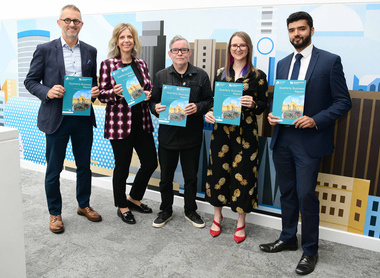
An up-to-date snapshot of the performance of the Greater Birmingham business community. It is the most comprehensive regular report of its kind in the city region.
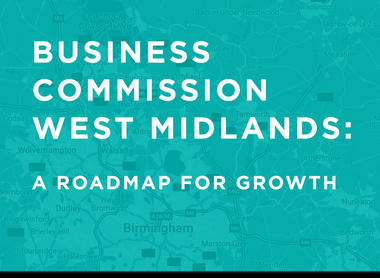
The Business Commission West Midlands provides a roadmap for unlocking business growth across the region.
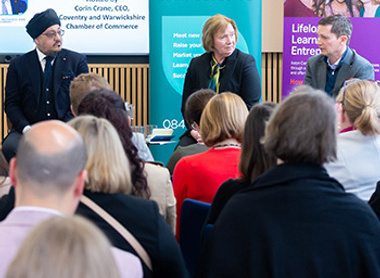
The Staffordshire Gateway Growth Panel is a research exercise led by business, for business, working to develop a roadmap for unleashing the potential of Staffordshire Gateway businesses.
To support local businesses, the Chamber policy team deliver a number of focussed campaigns throughout the year, which provide a platform to showcase local expertise, facilitate peer to peer learning and share best-practice among the local business community.

The Chamber's Future in Technology campaign aims to support local businesses in maximising opportunities related to technological development and digital access.
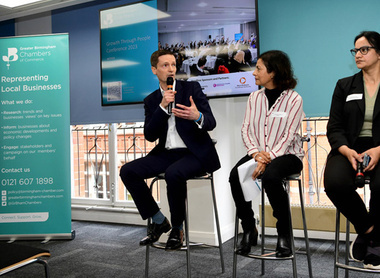
Our Growth Through People campaign aims to help local firms boost productivity by adopting new, best-practice approaches to leadership and people management.
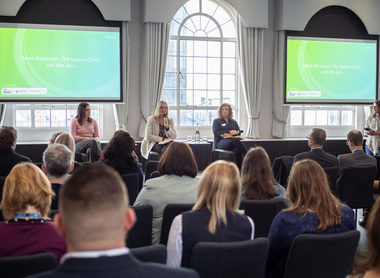
The Chamber’s Sustainable Business Series aims to share knowledge, best practice and guidance to enable local firms to reduce their environmental impact.
From the heart of the local business community, the Chamber policy team delivers bespoke research and stakeholder engagement activities to support local businesses in navigating the political landscape and shaping their commercial objectives. The team also regularly work with stakeholders to develop understanding of and effectively engage the local business community and inform policy decision-making.
As part of our role informing businesses of key policy decisions, legislative changes and opportunities which may impact them, the policy team produce regular briefings, translating what the latest policy developments mean for local firms.
The 2024 Autumn Budget landed as businesses across Greater Birmingham soug stability after years of political and economic uncertainty. Whilst the mantra of th new Government has centred upon unlocking growth, this report highlights the practical ramifications of the policy measures introduced in October and the direc impact they will have on local businesses.
This report marks the second year running in which we have tracked local business sentiment towards environmental sustainability and it’s reassuring to see the ongoing commitment businesses across Greater Birmingham have towards reducing their carbon footprint.
The GBCC has partnered with Colliers International to produce a clear guide on the business rates system in England and what it means for your business
Businesses are facing unprecedented challenges at the moment as the business community continues to bear the impact of the exogenous shocks from the rising costs of doing business. The data that was collected from our latest Quarterly Business Report shows that inflation is a growing concern amongst businesses and that the sustained soaring energy costs are one of the key driving factors behind this.
The GBCC's 2022 International Trade Index paints a mixed picture of the current trading landscape for businesses across Greater Birmingham.
Devolution refers to the transfer of power from central government functions to regional administrations.
The Chamber policy & strategic relationships team can be contacted about their work, sponsoring reports, commissioning research and participation in GBCC campaigns via the details below:
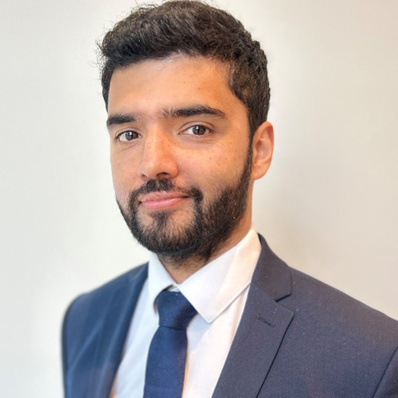
Director of External Affairs, GBCC

Director of External Affairs, GBCC
Raj Kandola is the Director of External Affairs at the Greater Birmingham Chambers of Commerce tasked with covering the organisation’s research, campaigning, stakeholder engagement and media & communications activity. Specific policy areas of focus include transport & infrastructure, international trade, education and environmental policy. In addition, he is responsible for managing the organisation’s Patronage scheme and the GBCC’s media and news content operations, including external media engagement and production of the organisation’s print and online news material
Prior to joining the Chamber in 2016, Raj worked in Communications for a former Shadow Minister and spent eight years in London recruiting staff across the financial services industry.
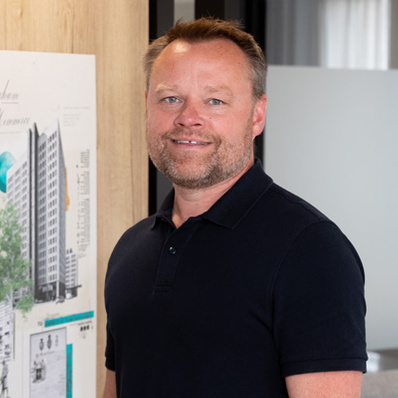
Patron Manager

Patron Manager
Jason joined the Chamber as Patron Manager in June 2021 from Hampton Manor, home of Solihull’s first Michelin starred restaurant.
After achieving a degree in Hospitality Management at the University of Wolverhampton, Jason held a number of sales, marketing and management positions in the leisure, hospitality and Education sectors.
Jason has worked for TGI Friday’s, Esporta Health Clubs and more recently was introduced to Birmingham as sales manager at Hotel du Vin.
His roles at Hotel du Vin and Hampton Manor allowed Jason to build many strong relationships and connections to Birmingham businesses and was the perfect grounding for his role supporting the top tier of membership at the Greater Birmingham Chamber.
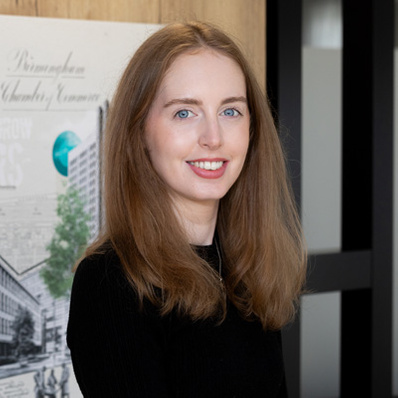
Senior Policy & Projects Manager

Senior Policy & Projects Manager
Emily Stubbs is Senior Policy and Projects Manager at the Greater Birmingham Chambers of Commerce, tasked with managing the delivery of bespoke research and business engagement projects. Emily’s specific areas of focus include education, employment & skills and business productivity.
Emily has recently co-authored the West Midlands and Warwickshire Local Skills Improvement Plan (LSIP), funded by the Department for Education and produced by Coventry and Warwickshire Chambers of Commerce in partnership with Greater Birmingham and Black Country Chambers. Through collaboration with regional stakeholders, businesses and further education providers, the WMW LSIP aims to support delivery of skills provision to meet employer demand and facilitate regional growth. Emily led the research and analysis underpinning stage 1 of the LSIP, which features insights from over 1,000 engagements with local employers.
Emily also works with colleagues across the Chamber on delivery of the Greater Birmingham Chambers of Commerce’s annual Growth Through People campaign, and the annual Birmingham Economic Review, produced by the Chambers in partnership with the University of Birmingham’s City-Region Economic and Development Institute (City-REDI).
Prior to joining the Chamber in 2017 as a Policy and Patron Adviser, Emily graduated from the University of Birmingham with a degree in Law. Emily is also an alumna of the Uprising Leadership Programme.
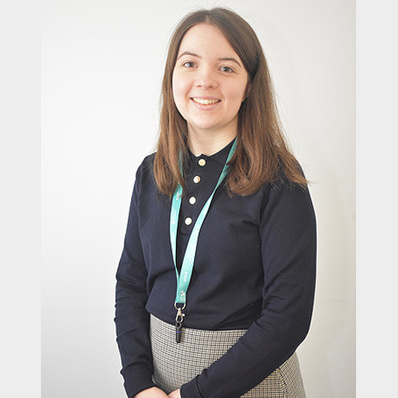
Policy and Projects Officer

Policy and Projects Officer
Gemma joined the GBCC in January 2023 as Policy and Projects Officer having recently completed an MA in International Relations and Global Governance and a BSc in French and Spanish at Aston University. At the Chamber, Gemma leads on the research for the Quarterly Business Report and the West Midlands Quarterly Economic Snapshot, as well as involvement in bespoke research projects, such as the West Midlands and Warwickshire Local Skills Improvement Plan, and providing ad hoc support to the international directorate.
Her previous work experience includes working as a research assistant within the Aston Centre for Applied Linguistics, a translation intern at an international law firm in Madrid, and an English language assistant at Air France. She is also an active member of the advisory board to the School of Social Sciences and Humanities at Aston University.